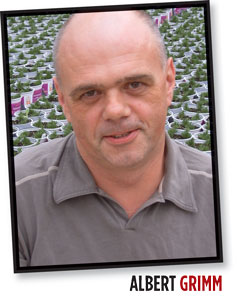2/1/2018
Retirement Directions
Albert Grimm

We’re as old as we feel, they say, and for those of us who are close to completing our sixth decade, this means that thoughts of retirement begin to creep into daily routine, whether we like it or not.
This has nothing to do with not wanting to work anymore. We can still get quite excited about our crops, our projects and about new concepts that we want to test, but there’s an increasing number of moments when our daily routine does little more than irritate us into an acknowledgment of fatigue. We tell ourselves that we’ve worked long and hard enough and that we should be entitled to feel a little exhausted from all those years of stress and pressure. There’s a carrot dangling from the wagon of the successfully retired, which advertises carefree leisure as a symbol of deserved accomplishment.
Reality, however, is just as unreliable as the grass on the other side of the fence. We all want to get old, but nobody wants to BE old. It’s hard for any achiever to watch assistants gradually find recognition for the accomplishments that we used to cherish. It’s becoming evident that sooner or later we’ll no longer be required for the successful micromanagement of the systems and structures that we created ourselves. Worse, another generation is not just living up to our standards; they’re creating new standards of their own and we may soon be seriously challenged to keep up with them.
Business continues to change, even if we become more static, and there will come a time when we find ourselves in a struggle to comprehend a new world that has outgrown our own precious sphere of influence.
This is the difference between retirement fantasies and the real thing. Age is going to increasingly test our self-esteem, while our ego urges us to fight a losing battle. Retirement no longer sounds so attractive when we have to come to terms with the inevitable loss of control that comes with it.
Midlife around the age of 50 represents the apex of most successful careers. The need to prove oneself has ceded to a sense of confidence in our capabilities. In midlife, we enter what author Gail Sheehy calls “the age of fearless accomplishment.” This is the peak of our influence on the world, and we rightfully expect rewards and results for all those years of conscientious preparation. By this time, we’ve acquired the confidence to delegate. We achieve by leading, not by doing. Thereby, we create a new generation of leaders who rapidly grew stronger and more competent themselves. In fact, it won’t be too long until they no longer need our approval for a sense of accomplishment, and within a few short years, these protégés will have approached the threshold of their own years of fearless accomplishment.
Such shifting of generations is natural and healthy, and when it happens, when our generation begins to fade, we have two choices: we can watch our own relevance slowly decline into retirement while we’re being forced to make excuses for not coping well with an increasingly overwhelming sense of uselessness. Or we can work on the realization that our contribution to the world can indeed be measured by less tangible aspects than hard data, namely in the values and integrity we can offer as a framework of reference to the achievers that take over from us.
Don’t retire—redirect! (So writes Gail Sheehy.) In late life, merely seeking competitive success turns increasingly into a hunt for chimeras. We no longer get genuine gratification from irrelevant competition. Transcendental purposes become much more rewarding and allow us to motivate the world around us. We can offer integrity and reason to balance strain from efficiency and urgency. Enduring legacy cannot be created by force or by clinging to control, but by creating lasting ripples of wisdom in the fabric of the world.
What do we want to be remembered for? For the profits and business achievements that we accomplished in our 50s, or for our values and guidance that will be preserved by future generations? GT
Albert Grimm is head grower for Jeffery’s Greenhouses in St. Catharines, Ontario, Canada.